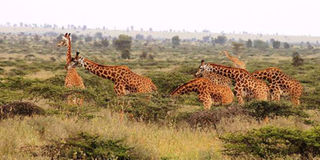Kenya fights to protect declining population of Maasai giraffes

Maasai giraffes graze at Nairobi National Park on June 17, 2015 PHOTO | WACHIRA MWANGI | NATION MEDIA GROUP
Wildlife stakeholders in Kenya are concerned about the declining population of the Maasai giraffe following a significant increase in poaching for its meat.
A 2021 National Wildlife census report shows that Kenya is home to three giraffe sub-species that include the Maasai, Nubian and reticulated, whose total population stands at 34,240.
The report states that there are 13,732 Maasai, 970 Nubian and 19,740 reticulated giraffes in the country.
The Maasai giraffes are found in Taita Taveta, Kajiado, Narok and Makueni counties. However, the key stronghold for the species is the Amboseli and the Tsavo ecosystem.
The International Union for Conservation of Nature (IUCN) has listed the Maasai giraffe as a species of least concern.
The Maasai giraffes are declining mainly due to poaching, said Amos Chege, the project officer for species conservation at the African Wildlife Foundation (AWF).
During a meeting of the Maasai Giraffe Tsavo Committee in Voi, Taita Taveta at the weekend, he said climate change, electrocution, loss of habitat and change in land use are some of the reasons for the decline.
"Some of the range areas that the giraffes used to occupy are declining due to land-use changes. With the need to conserve the ranges, we met to discuss the way forward and the actions we need to take," he said.
Some 4,300 Maasai giraffes live in the Tsavo ecosystem, he said. The ecosystem accounts for 30 per cent of the total population in Kenya and they migrate to Tanzania's Mkomazi National Park.
After the outbreak of Covid-19 in 2020, Kenya recorded an increase in the bushmeat trade, with giraffes and dik-diks being the most sought-after game meat.
To prevent further declines, the government, under the 2018 National Recovery and Action Plan for Giraffe, constituted a national committee to tackle the problem.
The team consists of officials from the Department of Wildlife and scientists from partner organisations that work in the rangelands where the species are found.
In Tsavo, the committee brought together wildlife experts from the Kenya Wildlife Service (KWS), Wildlife Research and Training Institute (WRTI), AWF, and Taita Taveta Wildlife Conservancies Association, among other partners.
"We are losing giraffes and we need to [adopt] measures to ensure that the population is protected," Mr Chege said.
He said the Tsavo committee will issue its report to the national team to gauge the progress made since the action plan was developed.
"We discussed the current status and agreed on various issues that all stakeholders within the landscape should work with KWS on data sharing, infrastructural development and land-use changes," he said.
The data will be used to create conservation and protection measures for the species.
Mr Chege said they are collaborating with ranches in the Tsavo ecosystem to prevent loss of giraffes to poaching and electrocution.
"The ranches are the main corridors for migration of wildlife. Some of the fences put up in these ranches are not to the [correct] standards and could be one of the reasons for electrocution. We have been engaging them on land-use planning to avoid areas utilised by wildlife," he said.
Tsavo East Senior Warden Wilson Njue concurred that the Maasai giraffe’s numbers are declining and they need to be protected.
"We are here to review the action plan recovery strategy to know where we stand for now. We will then advise the national committee on the progress for the management and conservation of this species," he said.
The bushmeat trade is a serious threat in the ecosystem, said Kenneth Kimitei, an AWF ecologist for the Tsavo and Mkomanzi conservation areas.
He said the trade is rife in ranches and called for collaboration with all partners to prevent the poaching of giraffes for bushmeat.
"Drought is also a challenge for the wildlife. We need to come up with an action plan on how to protect them," he said.





